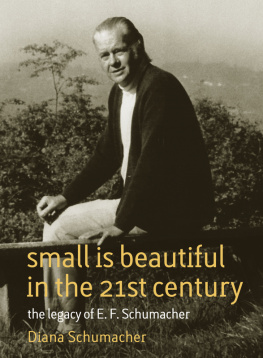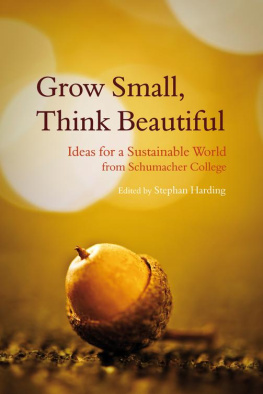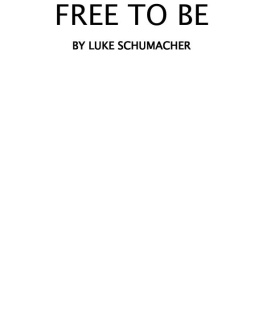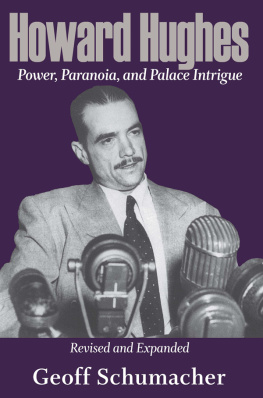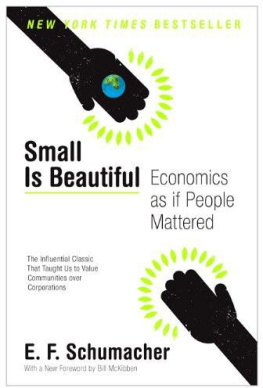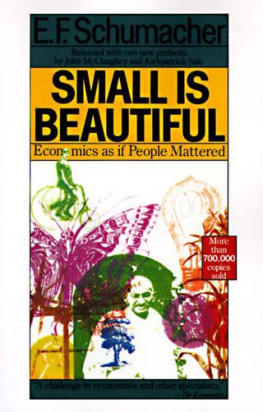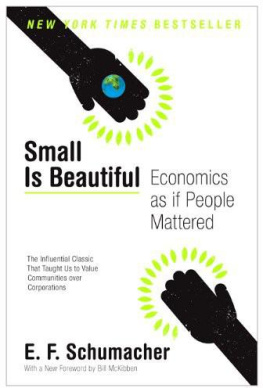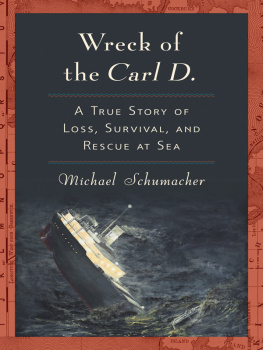small is beautiful
in the 21st century

Photo Sophie Baker
Schumacher Briefing No. 17
small is beautiful
in the 21st century
the legacy of E. F. Schumacher
Diana Schumacher

Published by Green Books
for The Schumacher Society
First published in 2011
by Green Books Ltd
Dartington Space, Dartington Hall, Totnes, Devon TQ9 6EN
www.greenbooks.co.uk
for The Schumacher Society
The CREATE Centre, Smeaton Road, Bristol BS1 6XN
Diana Schumacher 2011
The right of Diana Schumacher to be identified as the author of this book has been asserted by her under the UK Copyright, Design and Patents Act 1988.
All rights reserved
A catalogue record for this publication is available from the British Library.
Print edition ISBN 978 1 900322 75 1
PDF format ISBN 978 0 85784 043 1
ePub format ISBN 978 0 85784 097 4
The Schumacher Briefings
Founding Editor: Herbert Girardet
Contents
Its origins and offshoots
Practical Action (formerly the Intermediate Technology Development Group) & Jeevika Trust (formerly India Development Group)
The Soil Association and other projects
The Centre for Alternative Technology
nef and the E. F. Schumacher Society
Acknowledgements
This Schumacher Briefing could not have been published in its present form without the very significant input and contributions from the following people, who are listed alphabetically. I am indebted to each of them personally for their encouragement and inspiration, but more importantly for the part they are collectively playing in the emerging tapestry of humanitys future.
Godric Bader (the Scott Bader Commonwealth); John Elford (Green Books); John Fullerton (The New Economics Institute, USA); Dr G.K. Giri (Schumacher Centre for Development); Michael Gordon (The New Economics Institute, USA); Peter Harper (Centre for Alternative Technology); Patrick Holden (Formerly of the Soil Association); Satish Kumar (Resurgence Magazine / Schumacher College / The Small School); George McRobie (ex-Chairman of ITDG, India Development Group, Soil Association); Brian Padgett (formerly ITDGAT); Andrew Redpath (Jeevika Trust); Ian Roderick (Schumacher Institute); Sir Julian Rose (International Coalition to Protect the Polish Countryside); Richard St George (Schumacher Society); Peter Segger (Soil Association); Lily Swan (New Economics Foundation (nef)); Simon Trace (Practical Action); Stewart Wallis (New Economics Foundation); Susan Witt (The New Economics Institute, USA); and Laszlo Zsolnai (Corvinus University of Budapest). I am also grateful to all those, too numerous to mention here, who have given insight and inspiration.
My thanks to Stephen Powell for his comments on the first draft of this Briefing, and especially to John Elford, Green Books editor and publisher, for all his sound advice and, above all, for his infinite patience! My gratitude to all those who have kindly read each chapter and have given comment and advice, and to Pam Brabner for conscientiously typing successive drafts and updates. Last but not least, I would like to thank my husband Christian, the eldest son of Fritz Schumacher, who has read through and commented on each chapter, as well as giving much practical help, encouragement, and support.
My profound thanks to Verena Schumacher, Fritzs widow, for allowing me to use copyrighted material from his writings; and to Barbara Wood, his daughter, for use of the biographical information in Alias Papa, her biography of her father.
It has been difficult to keep up to date with all the developments of the organisations directly associated with the work of E. F. Schumacher, and to do them justice within this limited space. I apologise for any omissions, and take full responsibility for any oversights or errors.
It is my hope that the information on the ongoing work and relevance of Fritz Schumacher today will encourage and inspire readers to take up the challenge of transforming their world for the better in whatever way seems most appropriate to their circumstances, or through supporting one or other of the organisations mentioned in this Briefing. Please circulate this publication as widely as possible amongst your friends and through your own networks. Thank you also for your own support and action!
Diana Schumacher
Godstone, 2011
Chapter 1
Who was E. F. Schumacher?
Knowledge that does not help people to overcome their problems and to lead to a better and happier life is no use.Dr A.T. Ariyaratne
Ernst Friederich (Fritz) Schumacher, the economist-philosopher, was an unlikely pioneer of the Green Movement. He was born in Bonn in 1911, studied at Oxford as a Rhodes Scholar and returned to England before the Second World War to avoid living under Nazism. He died prematurely on a lecture visit to Caux, Switzerland, in September 1977.
Coming from a distinguished intellectual background (his father was the first Professor of Economics at Berlin University), Schumacher himself experienced a short but meteoric academic career in Germany, England and America, becoming assistant lecturer in banking and international finance at Columbia University at the age of 23. However, he always believed that one should strive for practical outcomes to philosophy and economic theory which would benefit people and society. In both his outer and his inner life he was a searcher for truth and dedicated to peace and non-violence. Unlike so many of his contemporary academics, however, he wanted to see these ideals translated into practical actions and right livelihoods.
He saw the need to provide his colleagues and audiences with philosophical maps and guidelines which related to reality. In the process, his life was one of constant questioning, including challenging most of the basic assumptions on which Western economic and academic theory have been based. What are the laws that govern the science of economics? What is the true value of money? What is the relationship between time and money? What is the real worth of work? And of development? These were the everyday questions which interested him most as an economist. Gradually he saw the need to expand the vision of contemporary economists to put human wellbeing at the centre of economic decision-making and everything within the context of environmental sustainability.
Part of Fritz Schumachers personal sorrow but analytical strength and objectivity lay in the fact that he remained an outsider for most of his life. He never fully integrated with his fellow students either in England or Germany, or with any particular community or sect. His original thinking and academic successes only set him further apart from his contemporaries, despite his humorous good nature and obvious talents. Early commercial assignments ranged from Wall Street to the City of London, to organising an independent and lucrative barter import-export enterprise run from Germany during the pre-war depression.
In 1937, owing to Hitlers frenzied ascendancy and his own feeling of the intellectual and political betrayal of Germany and its heritage by his nationalistic compatriots, he decided to abandon the majority of his social, family and business ties and to bring his young wife and son to London, where he was granted British citizenship. He was certain that until Germany could be purged of the Nazis evil presence there would be no peace in Europe; but that ultimately the reconstruction of Europe might be led from England. He hoped that he would then be in a position to be the vanguard of social and economic reform in Germany. Because of anti-German feeling among the English at the time, his work was not recognised publicly.
Next page
